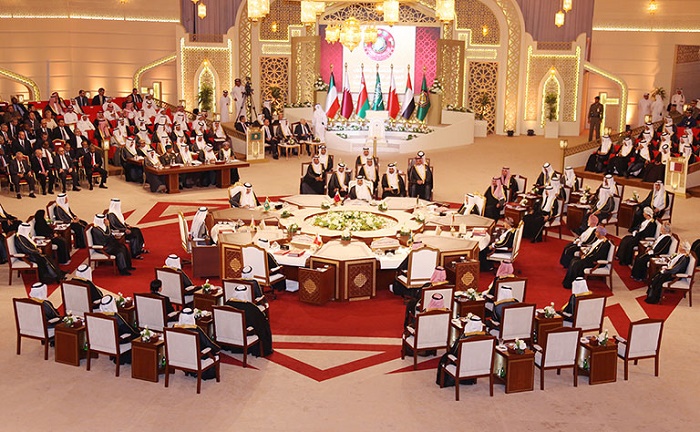Alwaght- The news of failure of Qatari-Bahraini negotiations came out as the members of the (Persian) Gulf Cooperation Council have experienced increasing rifts amid fast-moving recent developments in the region, West Asia.
Saudi Arabia, as the founder of the (P) GCC in 1981, has tried to play role of leader of the Persian Gulf Arab states and so direct the largest energy-supplying bloc in the whole world. As part of efforts to solidify their leadership of the Arab countries, the Saudi rulers promoted a threat posed by Iran to the region and the Arab monarchies.
As time went by, some of the members of the Saudi-dominated Council have decided to separate way from the Saudi policies and so take a more independent approach. This divergence is majorly driven by outbreak of crisis in some of West Asian countries and backing the terrorists active in the region by some members of the Arab bloc.
In the Syrian crisis for example, notwithstanding preliminary consensus between Saudi Arabia, Qatar, and Turkey on supporting the terrorists who battled to topple the Syrian President Bashar al-Assad, emergence of differences on categorization of the Syrian opposition groups between Turkey and Qatar on the one hand and Saudi Arabia on the other hand caused the biggest challenge in the (P) GCC to show face.
The common stances of Turkey and Qatar in support of the Egyptian Muslim Brotherhood movement seriously run counter to the Saudi Arabian regional policies that advocated the Wahhabists and Salafists. Riyadh’s main aim was bolstering the Salafist camp in the face of Muslim Brotherhood. Taking advantage of its media tool Al Jazeera news network, Qatar showed support for Muslim Brotherhood and its regional affiliates. This Doha approach turned into a factor influentially deepening Qatar-Saudi Arabia discord.
The rifts developed to a degree that in early 2014 Riyadh blacklisted Muslim Brotherhood as a terrorist movement, a step stirring a political standoff with Doha and pushed Saudi Arabia, Bahrain, and the UAE to recall ambassadors from Qatar. In response, the Qatari Emir Sheikh Tamim bin Hamad Al Thani gave orders that granted asylum in Qatar to some of the Bahraini opposition figures belonging to the Al Jalahma clan who had bright record in military and security posts in Bahrain.
These tensions continued existing until four months ago when as a result of the regional field developments the Bahraini and Qatari leaders decided to relax their strained relations. But, the contacts between security institutions of the two sides were announced to have failed. A couple of days ago, the Qatari Foreign Minister Sheikh Mohammed bin Abdulrahman Al Thani posted on Twitter that the behavior of the Bahraini representatives during the dialogue was undiplomatic and this foiled the bilateral talks.
Additionally, the state-run Al Jazeera English news network of Qatar following the Bahraini uprising aired a documentary titled Bahrain: Shouting in the Dark. Gaining a global attention, the Al Jazeera film even led to escalated tensions between Doha and Manama. In 50 minutes, the documentary shed light on the arbitrary arrests of the Bahraini people, including the footballers and aid workers, by the government. Airing the film provoked the Bahraini officials like Naser bin Hamad Al Khalifa, the son of Bahrain’s king, to react against the Qatari news channel. He said that "our kingdom and our nation are bigger than being pictured by the notorious Al Jazeera." Also reacting to the documentary, the Bahraini Foreign Minister Khalid bin Ahmed Al Khalifa asserted that airing the film has damaged all of the efforts to maintain the critical conditions in Bahrain and made things back to square one.
A continuation of this dispute between Bahrain and Qatar certainly drew the Saudi Arabian worries about conditions of the five-member Arab council. While Riyadh went to great lengths to use its economic, political, and military strength in order to build a united front in the face of Tehran and the Axis of Resistance in the region, Oman, on the other side, which is a member of the (P) GCC has opposed a proposal that urged upgrading the block from a current council to a EU-style union. Oman is not the only member that does not walk in line with Saudi Arabia’s policies, Kuwait has recently told of an interest to talk about the regional issues with Iran.
The gaps between (P) GCC's countries are not purely strategic, they go beyond that; they are also noticeably geographical. For example, currently all of them hold discords on the border lines that separate their territories. Qatar and Bahrain are in dispute over an archipelago which in addition to holding gas and oil reserves is strategically significant.
On the other side, Qatar that proved it has a will to adopt an approach independent of that of Saudi Arabia has begun to show sensitivity to its southern Al Khafous region, where Saudi has an eye on it. Qatar's Al Khafous region is located on a road that leads to Saudi Arabia’s military sea base of Khawr Al Udayd in southern Qatar. The energy experts suggest that this 25-square kilometer region holds nearly 15 billion oil barrels and 650 million cubic meters of natural gas.
Additionally, Al Khafous operates as a trading link between Qatar and the UAE, Doha's biggest trade partner in the Persian Gulf region.
So, if Qatar's political rifts with Saudi Arabia and Bahrain see no settlement or at best see no easing, their territorial disputes more than before rise to become importantly deep gaps between the Arab states because up to now their border disputes were compromised under the cover of a strategic convergence but today due to Saudi Arabia’s interventionist policies in Syria, Iraq, and Yemen the convergence is fading away. Actually, it can be concluded that Al Saud’s and its allies' efforts to destabilize the region have delivered the reverse and now are returning to them.



























